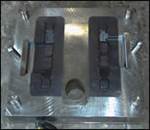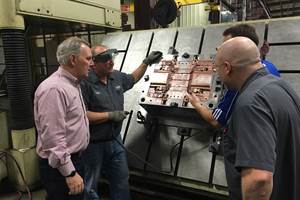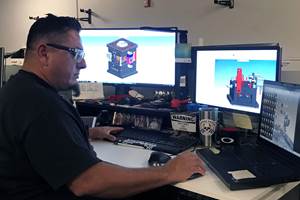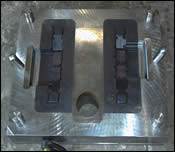Standardized Insert System Reduces Setup Times and Leadtimes
Aside load insert system has been developed by a moldmaker that works with standardized mold base systems.
Aside load insert system has been developed by a moldmaker that works with standardized mold base systems—allowing moldmakers to ship molds and mold inserts more quickly to their customers.
Kenton, OH-based Modular Mold Systems, a division of Pleasant Precision, Inc.—a moldmaker and a provider of interchangeable mold insert systems—developed the side load system in response to one of its customers who had been looking for a better way to use standardized mold base systems that are currently available. Modular Mold Systems President Ron Pleasant notes that the customer prefers a quick change system, which allows him to easily install the mold. However, Pleasant saw that the current system could work even better with some tweaking. “We decided we could standardize some aspects and then carry these products in stock,” Pleasant explains.
System Features
These systems—compatible with industry standard U-Frame sizes 08/09 and 10/12—have inserts that are standard laminated P-20 construction. Pleasant notes that solids and other steel types are available for special order. “Ejector plates are centered with the B plate and inserts are larger than standard to allow full useable space on the ejector plates,” he explains. “Inserts are still fully compatible with standard U-Frames and offer more cavity space for the ability to work with slides and accommodate larger parts.”
Pleasant notes that when the company designed the side load system, they added adjustability and standardized some of the methodologies required in the design process. “We placed everything on a true centerline and made everything a little bigger so we could get a little room in the smaller inserts,” he states. “Then the customer could get more of his product into the smaller units. Our customer wants to use all of their standard frames so we can’t really fool around with the interface side of it, but we can start to adjust some of the insert sizes above the master frame.”
“Another thing we decided was that we needed to have cover ejection,” Pleasant continues. “These parts tend to have lots of undercuts and are symmetrical. They need to come out of the cover and stick in the injector. If you don’t do that the mold will fail, so we needed a standardized method to put cover ejection in. This helped our ability to respond to those particular parts that needed cover ejection.
Applications
According to Pleasant, this system is suitable for the automotive market because the parts are small, they tend to be generically similar to each other, and they have undercuts and slides. “Often, the customer will want four, eight or 16 cavities, which tend to fit in this small insert size and it meets the customers’ ability of being a lean setup where they can change mold inserts multiple times in a week and not have a lot of setup time,” Pleasant elaborates. “Standardized mold base systems serve these requirements quite well, so by building a side load insert that fits into that already well nested product, and then adding more standards to it—allows us to become yet more competitive with our delivery times and our cost per injection mold.”
Related Content
OEE Monitoring System Addresses Root Cause of Machine Downtime
Unique sensor and patent-pending algorithm of the Amper machine analytics system measures current draw to quickly and inexpensively inform manufacturers which machines are down and why.
Read MoreDynamic Tool Corporation – Creating the Team to Move Moldmaking Into the Future
For 40+ years, Dynamic Tool Corp. has offered precision tooling, emphasizing education, mentoring and innovation. The company is committed to excellence, integrity, safety and customer service, as well as inspiring growth and quality in manufacturing.
Read MoreMold Design Review: The Complete Checklist
Gerardo (Jerry) Miranda III, former global tooling manager for Oakley sunglasses, reshares his complete mold design checklist, an essential part of the product time and cost-to-market process.
Read MoreMaking Quick and Easy Kaizen Work for Your Shop
Within each person is unlimited creative potential to improve shop operations.
Read MoreRead Next
How to Increase Polishing Efficiencies
A concurrent approach to polishing increases the man-and-machine efficiency while streamlining workflow to help attain ever-decreasing leadtimes.
Read MoreReasons to Use Fiber Lasers for Mold Cleaning
Fiber lasers offer a simplicity, speed, control and portability, minimizing mold cleaning risks.
Read MoreHow to Use Strategic Planning Tools, Data to Manage the Human Side of Business
Q&A with Marion Wells, MMT EAB member and founder of Human Asset Management.
Read More


















